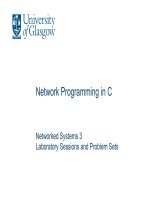Template Metaprogramming In C++
Bạn đang xem bản rút gọn của tài liệu. Xem và tải ngay bản đầy đủ của tài liệu tại đây (252.55 KB, 113 trang )
Template Metaprogramming in C++
CS242, Fall 2009
Keith Schwarz
Preliminaries
A C++ template is a type or function
parameterized over a set of types, functions, or
constants.
template <typename One, typename Two>
struct Pair
{
One first;
Two second;
};
template <typename One, typename Two>
struct Pair
{
One first;
Two second;
};
template <typename One, typename Two>
struct Pair
{
One first;
Two second;
};
Providing arguments to a template instantiates
the template with those arguments. Instantiation
occurs at compile-time.
Pair
Pair<int, char>
int
char
One
Two
Pair
One
Pair
Two
Pair<float, long>
float
long
One
Two
Template Specialization
●
●
A version of a template to use when a specific
pattern of arguments are supplied.
Structure independent of primary template.
●
●
●
Can add/remove functions from interface, etc.
Full specialization used when all arguments are
specified.
Partial specialization used when arguments
have a particular structure.
/* Primary template */
template <typename T> class Set
{
// Use a binary tree
};
/* Full specialization */
template <> class Set<char>
{
// Use a bit vector
};
/* Partial specialzation */
Template <typename T> class Set<T*>
{
// Use a hash table
};
/* Primary template */
template <typename T> class Set
{
// Use a binary tree
};
/* Full specialization */
template <> class Set<char>
{
// Use a bit vector
};
/* Partial specialzation */
template <typename T> class Set<T*>
{
// Use a hash table
};
/* Primary template */
template <typename T> class Set
{
// Use a binary tree
};
/* Full specialization */
template <> class Set<char>
{
// Use a bit vector
};
/* Partial specialzation */
template <typename T> class Set<T*>
{
// Use a hash table
};
A metaprogram is a program that produces or
manipulates constructs of a target language.
A template metaprogram is a C++ program that
uses templates to generate customized C++ code
at compile-time.
Why would you ever want to do this?
C++ TMP
C++
C
Assembly
Machine Code
Template Metaprogramming In Action
Part One: Policy Classes
template <typename T> class Vector
{
public:
/* ... ctors, dtor, etc. */
T& operator[] (size_t);
const T& operator[] (size_t) const;
void insert(iterator where,
const T& what);
};
/* ... etc. ... */
Vector
Range Checking
Type T
Synchronization
Templates are parameterized over types, not
behaviors.
A policy class is a type that implements a
particular behavior.
template <typename T>
class Vector
{
public:
/* ... ctors, dtor, etc. */
T& operator[] (size_t);
const T& operator[] (size_t) const;
void insert(iterator where,
const T& what);
};
/* ... etc. ... */
template
typename LockingPolicy>
class Vector
{
public:
/* ... ctors, dtor, etc. */
T& operator[] (size_t);
const T& operator[] (size_t) const;
void insert(iterator where,
const T& what);
};
/* ... etc. ... */
template
typename LockingPolicy>
class Vector: public RangePolicy,
public LockingPolicy
{
public:
/* ... ctors, dtor, etc. */
T& operator[] (size_t);
const T& operator[] (size_t) const;
void insert(iterator where,
const T& what);
};
/* ... etc. ... */
Sample Range Policy
class ThrowingErrorPolicy
{
protected:
~ThrowingErrorPolicy() {}
};
static void CheckRange(size_t pos,
size_t numElems)
{
if(pos >= numElems)
throw std::out_of_bounds("Bad!");
}









